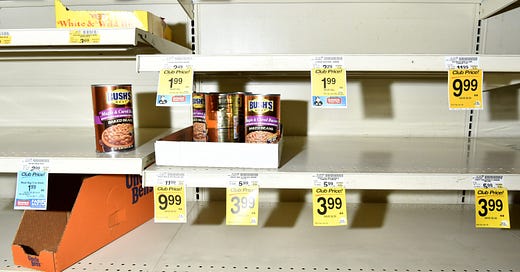
In a moment of crisis, people like to assert a sense of control, no matter how illusory, by reverting to well-worn habits. In the case of COVID-19, that means using it as a vessel for whatever political hobbyhorses they had before the pandemic. So it's no surprise to see the headline, "There Are No Libertarians in an Epidemic." By "libertarians," the author means advocates of small government and individual liberty.
This talking point has since been taken up by others in a more technically accurate form: there are no libertarians in a pandemic. The idea is that when a crisis hits, everyone suddenly realizes how much they need Big Government.
This is a bizarre argument to make about a virus that got a foothold partly because of the corrupt and tyrannical policies of a communist government in China. The outbreak is currently at its worst in Italy, where socialized medicine has not turned out to be a panacea. And it was allowed to get out of control in America because the feds imposed an incompetent government monopoly on COVID-19 testing, blocking the use of better and faster tests developed by private companies.
Not only has Big Government been a significant magnifier of this crisis, the actual remediating solutions have been largely implemented through voluntary action.
If much of the country is shut down right now, it is not through some kind of national martial law. Governors of several states have imposed shutdown orders, but most of the shutdowns happened more than a week earlier through the spontaneous and decentralized decisions of thousands of private organizations and businesses. Nobody told my kids' private school to shut down. Nobody ordered our restaurants to change over to curbside service. Our local theater canceled or postponed every upcoming show on its own accord. My gym initially resisted the shutdown—nobody is more convinced he's an invincible specimen of perfect health than a gym rat—but after a few days management bowed to the vox populi.
To the extent government has been involved in this shutdown, it has been mostly on the local level, with school boards leading the way—because the most effective way to get Americans to realize an issue is serious is to send their children home from school.
Big Government types like to talk about "collective action" problems and assume that nobody could agree or cooperate on anything unless the government makes them do it. But the last few weeks are a direct refutation of this maxim. No government authority short of martial law could enforce the level of shutdown we're seeing in this country. It can only be done by the spontaneous agreement of a majority of 300 million people.
The more conspicuous role for the government in this crisis hasn't been shutting things down, but opening things up. There has been a surge of emergency deregulation to lift artificial barriers that prevent people from solving problems.
I have already mentioned the loosening of federal controls on the private development of diagnostic testing, after the disastrous attempt to centralize it all at the CDC. We're also seeing the suspension of restrictive licensing requirements on doctors and nurses to allow them to work across state lines, so they can go where the shortages are worst. There has also been a whole series of waivers on restrictions on the transportation and serving of food and beverages in order to help restaurants stay in business and feed their customers by offering curb-side service.
Meanwhile, we're seeing the destructive consequences of government controls. For example, a crackdown on "price gouging" in New York City has exacerbated shortages of hand sanitizers and disinfectants because retailers can't pass on the higher prices charged by wholesalers. Price controls lead to shortages? That's Free Market Economics 101.
If you want to get into Libertarian Debate Club with me, I will acknowledge that the government does have a proper role in a pandemic. Just as your right to swing your arms ends where your fist hits my nose, your right to liberty does not include the right to knowingly or negligently transmit a deadly disease to others. Remember Typhoid Mary, who was involuntarily confined for 26 years because she refused to stop seeking work as a cook after being identified as an asymptomatic carrier of salmonella typhi.
So government has its role in ensuring the humane quarantine of the infected.
But that alone is not what's going to get us through this, especially not at this point. What will get us through is innovation, which will be led by a dynamic private economy.
So far, we have seen distilleries using their alcohol to produce bootleg hand sanitizer. When a hospital in Italy needed replacement valves for intensive care machinery, a local entrepreneur brought over his 3-D printer and made new ones. There is already a group banding together online to make 3-D printing designs available for manufacturing ventilators. That's just the beginning. We can expect to see a lot more.
As for how we will all survive this shutdown in our work and personal lives—where would we be without a whole host of private businesses, from internet mail-order giants to videoconferencing services?
While I'm hearing from friends about their public school kids reenacting Lord of the Flies at home, my private school has turned on a dime to offer practically a whole day's worth of instruction over the Internet, relying on file-sharing and videoconferencing services. For many other parents, the hero of this national school shutdown is going to be Khan Academy, a private non-profit creator of online educational videos that grew out of the entrepreneurial ferment of Silicon Valley.
The government did not create and could not have created all of these services. They were created by private initiative in a free market.
This is how liberty is going to help us get through the pandemic.



